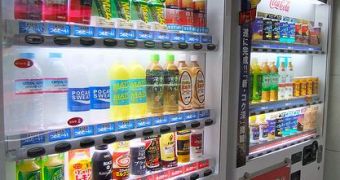A new study carried out by researchers from the University of Michigan Medical School concluded that vended foods and beverages may be linked to diabetes, obesity and coronary artery disease.
The scientists analyzed data from 2,309 children, going from grades 1 to 12, in schools across the United States, based on questionnaires that gave the 24-hour food intake on a given school day.
Another set of food intake data, that accounted for day-to-day usual consumption, was obtained from a group of students.
The results showed that 22 percent of school children (among those surveyed) ate competitive or vended foods, during a school day.
Also, in high school, where 88 percent of schools have vending machines - unlike 52% of middle schools and 16% of elementary schools, vended food usage was the highest.
The problem is that competitive food and beverage consumers had a much higher sugar intake and lower dietary fiber, vitamin B levels and iron intake that non-consumers.
The research noted that more than two-thirds of beverages offered in school vending machines and stores are soft drinks.
Also, elementary school children ate mostly fried snacks and desserts from vending machines, and beverages other than milk and fruit juice were the most popular among middle and high school students.
Other favorite vended foods included candy, snack chips, crackers, cookies, cakes and ice cream, and of these bad habits in food had no connection whatsoever with family income or race and ethnicity.
“The foods that children are exposed to early on in life influence the pattern for their eating habits as adults,” says lead author of the study Madhuri Kakarala, MD, PhD, clinical lecturer of internal medicine at the U-M Medical School.
Research was also made on foods sold in school stores, snack bars and other related sales that compete with what the USDA lunch program offers, and scientists concluded that they pose the same risk of health problems in school-aged children.
Junk food in schools was already criticized by previous studies, assessing the impact it has on children's overall health, but this new study is the first to analyze competitive foods and beverages, sold at snack bars or vending machines.
“Consumption of vended foods and beverages currently offered in US schools is detrimental to children's diet quality,” said Kakarala.
“Childhood obesity, resulting from poor dietary choices, such as those found in this study, greatly increases the risk for many chronic diseases.
“A healthy school food environment can reduce these dietary risks.”
Scientists concluded that school children who consume foods purchased in vending machines are more likely to develop poor diet quality, that can cause overweight, obesity or chronic health problems like diabetes and coronary artery disease.
The authors of the study recommend that school administrators design guidelines that limit the vended and competitive foods and beverages to those that are rich with nutrients and not energy-dense.
Also, the school food service personnel could promote more healthful foods such as fresh fruit, yogurt, low-fat milk, juice and sandwiches.
The results of this study appear in the September issue of the Journal of School Health.

 14 DAY TRIAL //
14 DAY TRIAL //